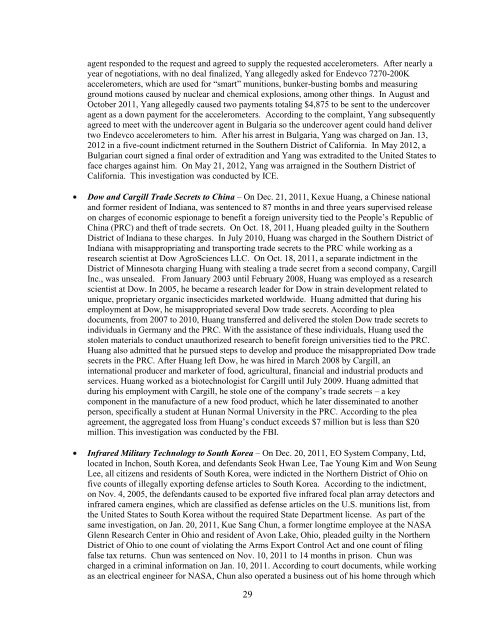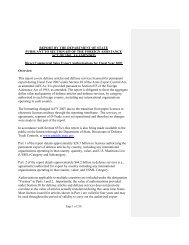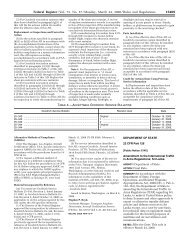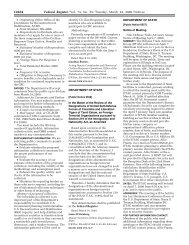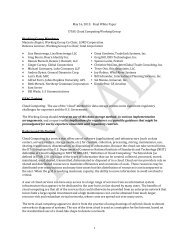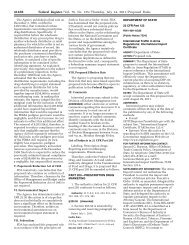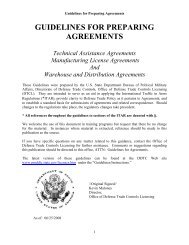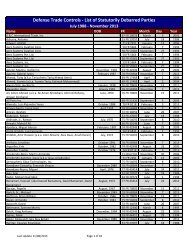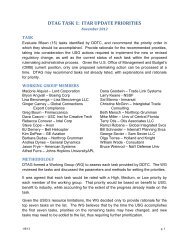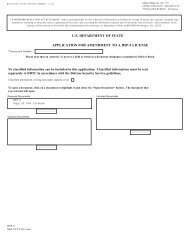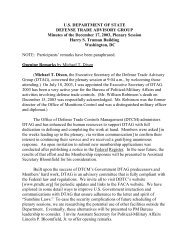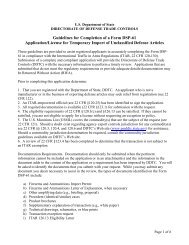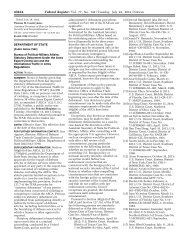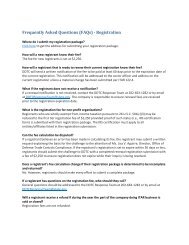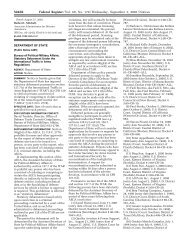Major Export Enforcement Cases - Directorate of Defense Trade ...
Major Export Enforcement Cases - Directorate of Defense Trade ...
Major Export Enforcement Cases - Directorate of Defense Trade ...
Create successful ePaper yourself
Turn your PDF publications into a flip-book with our unique Google optimized e-Paper software.
agent responded to the request and agreed to supply the requested accelerometers. After nearly a<br />
year <strong>of</strong> negotiations, with no deal finalized, Yang allegedly asked for Endevco 7270-200K<br />
accelerometers, which are used for “smart” munitions, bunker-busting bombs and measuring<br />
ground motions caused by nuclear and chemical explosions, among other things. In August and<br />
October 2011, Yang allegedly caused two payments totaling $4,875 to be sent to the undercover<br />
agent as a down payment for the accelerometers. According to the complaint, Yang subsequently<br />
agreed to meet with the undercover agent in Bulgaria so the undercover agent could hand deliver<br />
two Endevco accelerometers to him. After his arrest in Bulgaria, Yang was charged on Jan. 13,<br />
2012 in a five-count indictment returned in the Southern District <strong>of</strong> California. In May 2012, a<br />
Bulgarian court signed a final order <strong>of</strong> extradition and Yang was extradited to the United States to<br />
face charges against him. On May 21, 2012, Yang was arraigned in the Southern District <strong>of</strong><br />
California. This investigation was conducted by ICE.<br />
Dow and Cargill <strong>Trade</strong> Secrets to China – On Dec. 21, 2011, Kexue Huang, a Chinese national<br />
and former resident <strong>of</strong> Indiana, was sentenced to 87 months in and three years supervised release<br />
on charges <strong>of</strong> economic espionage to benefit a foreign university tied to the People’s Republic <strong>of</strong><br />
China (PRC) and theft <strong>of</strong> trade secrets. On Oct. 18, 2011, Huang pleaded guilty in the Southern<br />
District <strong>of</strong> Indiana to these charges. In July 2010, Huang was charged in the Southern District <strong>of</strong><br />
Indiana with misappropriating and transporting trade secrets to the PRC while working as a<br />
research scientist at Dow AgroSciences LLC. On Oct. 18, 2011, a separate indictment in the<br />
District <strong>of</strong> Minnesota charging Huang with stealing a trade secret from a second company, Cargill<br />
Inc., was unsealed. From January 2003 until February 2008, Huang was employed as a research<br />
scientist at Dow. In 2005, he became a research leader for Dow in strain development related to<br />
unique, proprietary organic insecticides marketed worldwide. Huang admitted that during his<br />
employment at Dow, he misappropriated several Dow trade secrets. According to plea<br />
documents, from 2007 to 2010, Huang transferred and delivered the stolen Dow trade secrets to<br />
individuals in Germany and the PRC. With the assistance <strong>of</strong> these individuals, Huang used the<br />
stolen materials to conduct unauthorized research to benefit foreign universities tied to the PRC.<br />
Huang also admitted that he pursued steps to develop and produce the misappropriated Dow trade<br />
secrets in the PRC. After Huang left Dow, he was hired in March 2008 by Cargill, an<br />
international producer and marketer <strong>of</strong> food, agricultural, financial and industrial products and<br />
services. Huang worked as a biotechnologist for Cargill until July 2009. Huang admitted that<br />
during his employment with Cargill, he stole one <strong>of</strong> the company’s trade secrets – a key<br />
component in the manufacture <strong>of</strong> a new food product, which he later disseminated to another<br />
person, specifically a student at Hunan Normal University in the PRC. According to the plea<br />
agreement, the aggregated loss from Huang’s conduct exceeds $7 million but is less than $20<br />
million. This investigation was conducted by the FBI.<br />
Infrared Military Technology to South Korea – On Dec. 20, 2011, EO System Company, Ltd,<br />
located in Inchon, South Korea, and defendants Seok Hwan Lee, Tae Young Kim and Won Seung<br />
Lee, all citizens and residents <strong>of</strong> South Korea, were indicted in the Northern District <strong>of</strong> Ohio on<br />
five counts <strong>of</strong> illegally exporting defense articles to South Korea. According to the indictment,<br />
on Nov. 4, 2005, the defendants caused to be exported five infrared focal plan array detectors and<br />
infrared camera engines, which are classified as defense articles on the U.S. munitions list, from<br />
the United States to South Korea without the required State Department license. As part <strong>of</strong> the<br />
same investigation, on Jan. 20, 2011, Kue Sang Chun, a former longtime employee at the NASA<br />
Glenn Research Center in Ohio and resident <strong>of</strong> Avon Lake, Ohio, pleaded guilty in the Northern<br />
District <strong>of</strong> Ohio to one count <strong>of</strong> violating the Arms <strong>Export</strong> Control Act and one count <strong>of</strong> filing<br />
false tax returns. Chun was sentenced on Nov. 10, 2011 to 14 months in prison. Chun was<br />
charged in a criminal information on Jan. 10, 2011. According to court documents, while working<br />
as an electrical engineer for NASA, Chun also operated a business out <strong>of</strong> his home through which<br />
29


